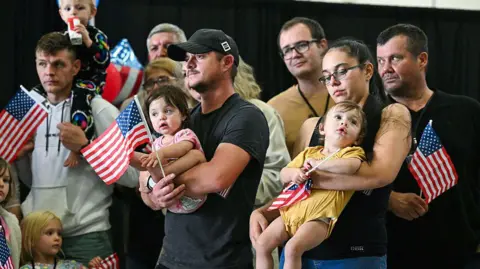First group of white South Africans lands in US under Trump refugee plan
 AFP
AFPA US-funded flight carrying the first group of 49 white South Africans has landed in Washington where the Trump administration is to grant them refugee status.
President Donald Trump has said the refugee applications for the country's Afrikaner minority had been expedited as they were victims of "racial discrimination".
The South African government has denied this saying any allegations of persecution would not meet the threshold required under "refugee law".
Immigrant rights activists have criticised the fast-track refugee initiative, describing it as "unfair" for the "most vulnerable". The Trump administration has halted almost all refugee admissions including those coming from countries at war.
The group of white South African refugees, who landed in Washington DC on Monday, received a warm welcome from US authorities at the airport.
Some held young children and waved small American flags in the arrival area adorned with red, white and blue balloons on the walls.
Usually the processing of refugees in the US takes months, even years, but this group has been fast tracked. UNHCR - the United Nations refugee agency - confirmed to the BBC it wasn't involved in the vetting, as is usually the case.
Asked directly on Monday why Afrikaners' refugee applications had been expedited compared with other groups, Trump said a "genocide" was taking place and that "white farmers" specifically were being targeted.
"Farmers are being killed, they happen to be white, but whether they're white or black makes no difference to me."
The US has criticised domestic South African policy, accusing the government of seizing land from white farmers without any compensation - something the southern African nation says has not happened.
In January President Cyril Ramaphosa signed a controversial law which allows the government to seize privately owned land without compensation in certain circumstances, when it is deemed "equitable and in the public interest".
There had been anger in South Africa over the slow pace of land reform in the three decades since the end of the racist apartheid system.
White South Africans make up 7.3% of the population, but own the vast majority of privately held farmland, according to a 2017 government report.
One of Trump's closest advisers, South African-born Elon Musk, has previously said there was a "genocide of white people" in South Africa and accused the government of passing "racist ownership laws".
The claims of a genocide of white people have been widely discredited.
On Monday, Democratic Senator Jeanne Shaheen described the resettlement as "baffling" given the "indefinite suspension for thousands of legitimate asylum seekers" from other countries.
In a statement sent to the BBC, Gregory Meeks, ranking Democratic member of the House Foreign Affairs Committee, said the Trump administration's refugee resettlement was "not just a racist dog whistle, it's a politically motivated rewrite of history".
"Refugee policy should protect the vulnerable, not serve an extremist agenda," he said.
Melissa Keaney, a lawyer with the International Refugee Assistance project, said the White House's decision to fast-track the Afrikaners' arrival amounted to "a lot of hypocrisy and unequal treatment".
"The speed at which that [the Afrikaners] were processed is remarkable and unprecedented, and required, I think, a lot of sort of bending rules by the state department and changing procedure," she told the BBC.
Her organisation is suing the Trump administration after it indefinitely suspended the US Refugee Admissions Program (USRAP) in January. She said that policy had left over 120,000 conditionally approved refugees in limbo.
Afrikaner author Max du Preez told the BBC's Newsday radio programme that claims of persecution of white South Africans were a "total absurdity" and "based on nothing".
Figures from the South African police show that in 2024, 44 murders were recorded on farms and smaller plots of agricultural land, with eight of those killed being farmers.
South Africa does not report on crime statistics broken down by race but a majority of the country's farmers are white, while other people living on farms, such as workers, are mostly black.
- Racially charged row between Musk and South Africa over Starlink
- What's really driving Trump's fury with South Africa?
Bilateral relations between the US and South Africa have been strained since President Trump first tasked his administration with resettling Afrikaners, a group with mostly Dutch ancestry, in the US.
In March, South Africa's ambassador to the US, Ebrahim Rasool, was expelled after accusing President Trump of using "white victimhood as a dog whistle", leading to the US accusing Mr Rasool of "race-baiting".
The US has also criticised South Africa for taking an "aggressive" position against Israel at the International Court of Justice (ICJ), where Pretoria has accused Prime Minister Benjamin Netanyahu's government of genocide against Palestinians - a claim the Israelis strongly reject.
President Trump's openness to accepting Afrikaner refugees comes as the US has engaged in a wider crackdown on migrants and asylum seekers from other countries.
Additional reporting by Khanyisile Ngcobo in Johannesburg, Nomia Iqbal & Cai Pigliucci in Washington DC
More BBC stories about South Africa:
 Getty Images/BBC
Getty Images/BBCGo to BBCAfrica.com for more news from the African continent.
Follow us on Twitter @BBCAfrica, on Facebook at BBC Africa or on Instagram at bbcafrica
